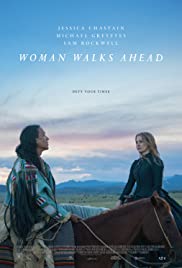
WOMAN WALKS AHEAD
US, 2017, 100 minutes, Colour.
Jessica Chastain, Michael Greyeyes, Sam Rockwell, Chaske Spencer, Ciaran Hinds, Bill Camp.
Directed by Susanna White.
This film tells an interesting story, the story of the 19th-century American artist, Catherine Weldon, who had painted a number of celebrities, including politicians.
Commentators note that the film of differs from the truth about Catherine Weldon herself, her affairs, leaving her husband. Here she is presented as a widow.
However, she decides that she wants to paint Native Americans in their context, specifically Sitting Bull, with memories of Custer and his stand. She receives a lot of opposition from the military, embodied in Sam Rockwell’s hostile officer, and from the local Indian agent, Ciaran Hinds, who has married a local woman who serves as his interpreter.
Despite so much opposition, she eventually meets Sitting Bull, working as a farmer (Michael Greyeyes), wins his confidence, painted his portrait, becomes involved in politics, especially with an upcoming treaty with the Indians which will result in the limitations of their land. And she is treated violently by the locals
Catherine Weldon is played by Jessica Chastain as a strong-minded woman with a mission.
1. Based on a true story? (But the sanitising of the character of Catherine Weldon?)
2. The 1890s, Native Americans, the end of the wars, the proposal of treaties, the oppression of the Native Americans?
3. The New York opening? The train travel across the United States? The West? The railway station, the open plains, the town, the Indian settlement, the Native Americans working gardens, potatoes? The hut? Sitting Bull’s cabin? The Indian agent, the visiting general, accommodation? The meeting for the boat? The musical score?
4. Seeing the events from the point of view of Native Americans, the history, bond with the land, traditions, nature, the Buffalo, the fights, the sense of the supernatural? Operation? The Ghost Dances?
5. Seeing the events from the point of view of white Americans, Catherine Weldon, wanting to paint, the experience of the landscapes, meeting the Native Americans, the encounters with Sitting Bull? Seeing the events from the point of view of the military, memories of the fights and massacres, regrets yet control? The Indian agent and his Native American wife? Giving up the old ways and language?
6. Catherine Weldon, widow, money, the decision to paint, her reputation, travelling to the west, the encounter with Groves and his negative approach? The agent and is intending to have her arrested? The rumours that she was a spy? Male hostility on the train? The encounter with Sitting Bull’s nephew, meeting the chief and his potatoes, the offer of $1000, his agreement, the cabin and accommodation, going to his special cabin, her unwillingness to ride the horse and her father’s treatment of her when she was eight, wanting to paint outside, to wear his regalia? The sittings and Groves’ spying?
7. Catherine learning more about the Native Americans, the proposal of the treaty, the injustice of the taking of the land? Her writing to politicians? Her urging Sitting Bull? Her going to the town, her being bashed? Her visit to the dinner and the men seeing her injuries?
8. The bond with Sitting Bull, rumours about a relationship? Language, translations? The encounters with Groves and the animosity?
9. Sitting Bull and his gathering the tribes, the discussions about the treaty, everybody coming to the town, the bribed speeches, the general presiding, his respect for Sitting Bull? The chief’s arrival, his speech? Hostility, the threats of arrest, the troops and the shooting him?
10. Catherine, her grief? The US government and the passing of the treaty legislation? The consequences?
11. The film as a eulogy for the Native Americans?